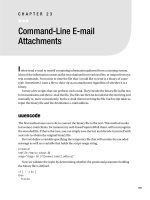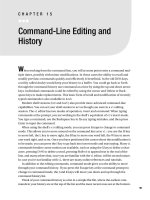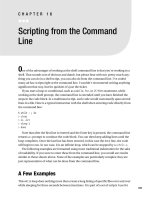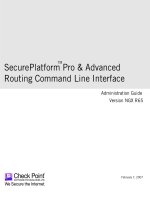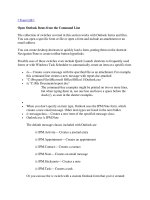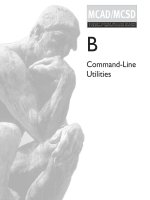Linux command line & shell scripting bible
Bạn đang xem bản rút gọn của tài liệu. Xem và tải ngay bản đầy đủ của tài liệu tại đây (14.37 MB, 843 trang )
www.it-ebooks.info
Blum ffirs.tex V2 - 04/04/2008 4:23pm Page iii
Linux
®
Command Line and
Shell Scripting
Bible
Richard Blum
Wiley Publishing, Inc.
www.it-ebooks.info
Blum ffirs.tex V2 - 04/04/2008 4:23pm Page ii
www.it-ebooks.info
Blum ffirs.tex V2 - 04/04/2008 4:23pm Page i
Linux
®
Command Line and
Shell Scripting
Bible
www.it-ebooks.info
Blum ffirs.tex V2 - 04/04/2008 4:23pm Page ii
www.it-ebooks.info
Blum ffirs.tex V2 - 04/04/2008 4:23pm Page iii
Linux
®
Command Line and
Shell Scripting
Bible
Richard Blum
Wiley Publishing, Inc.
www.it-ebooks.info
Blum ffirs.tex V2 - 04/04/2008 4:23pm Page iv
Linux
®
Command Line and Shell Scripting Bible
Published by
Wiley Publishing, Inc.
10475 Crosspoint Boulevard
Indianapolis, IN 46256
www.wiley.com
Copyright © 2008 by Wiley Publishing, Inc., Indianapolis, Indiana
Published simultaneously in Canada
ISBN: 978-0-470-25128-7
Manufactured in the United States of America
10987654321
No part of this publication may be reproduced, stored in a retrieval system or transmitted in any form or
by any means, electronic, mechanical, photocopying, recording, scanning or otherwise, except as permit-
ted under Sections 107 or 108 of the 1976 United States Copyright Act, without either the prior written
permission of the Publisher, or authorization through payment of the appropriate per-copy fee to the Copy-
right Clearance Center, 222 Rosewood Drive, Danvers, MA 01923, (978) 750-8400, fax (978) 646-8600.
Requests to the Publisher for permission should be addressed to the Legal D epartment, Wiley Publishing,
Inc., 10475 Crosspoint Blvd., Indianapolis, IN 46256, (317) 572-3447, fax (317) 572-4355, or online at
/>Limit of Liability/Disclaimer of Warranty: The publisher and the author make no representations or
warranties with respect to the accuracy or completeness of the contents of this work and specifically disclaim
all warranties, including without limitation warranties o f fitness for a particular purpose. No warranty may
be created or extended by sales or promotional materials. The advice and strategies contained herein may
not be suitable for every situation. This work is sold with the understanding that the publisher is not en-
gaged in rendering legal, accounting, or other professional services. If professional assistance is required,
the services of a competent professional person should be sought. Neither the publisher nor the author
shall be liable for damages arising herefrom. The fact that an organization or Website is referred to in this
work as a citation and/or a potential source of further information does not mean that the author or the
publisher endorses the information the organization o r Website may provide or recommendations it may
make. Further, readers should be aware that Internet Websites listed in this work may have changed or
disappeared between when this work was written and when it is read.
For general information on our other products and services or to obtain technical support, please contact
our Customer Care Department within the U.S. at (800) 762-2974, outside the U.S. at (317) 572-3993 or
fax (317) 572-4002.
Library of Congress Cataloging-in-Publication Data is available from the publisher.
Trademarks: Wiley, the Wiley logo, and related trade dress are trademarks or registered trademarks o f
John Wiley & Sons, Inc. and/or its affiliates, in the United States and other countries, and may not be used
without written permission. Linux is a registered trademark of Linus Torvald. All other trademarks are the
property of their respective owners. Wiley Publishing, Inc., is not associated with any product or vendor
mentioned in this book.
Wiley also publishes its books in a variety of electronic formats. Some content that appears i n print may
notbeavailableinelectronicbooks.
www.it-ebooks.info
Blum ffirs.tex V2 - 04/04/2008 4:23pm Page v
To all the people who’ve helped form my education. Parents,
relatives, teachers, coworkers, and even anonymous posters on the
Internet. Always be prepared to accept education from wherever
you find it. Always continue to learn new things. ‘‘For the LORD
gives wisdom, and from his mouth come knowledge and
understanding.” Proverbs 2:6 (NIV)
www.it-ebooks.info
Blum fauth.tex V2 - 04/04/2008 4:42pm Page vi
About the Author
Richard Blum has worked in the IT industry for over 19 years as both a systems and network
administrator. During this time he has administered Unix, Linux, Novell, and Microsoft servers,
as well as helped design and maintain a 3500-user network utilizing Cisco switches and routers.
He has used Linux servers and shell scripts to perform automated network monitoring, and has
written shell scripts in just about every Unix shell environment.
Rich has a bachelor of science degree in Electrical Engineering, and a master of science degree
in Management, specializing in management information systems, from Purdue University. He
is the author of several Linux books, including sendmail for Linux, Running qmail, Postfix, Open
Source E-mail Security, Network Performance Open Source Toolkit,andProfessional Assembly Language
Programming. H e’s also a coauthor of Professional Linux Programming and Linux For Dummies, 8th
Edition. When he’s not being a computer nerd, Rich plays bass guitar for his church worship band
and enjoys spending time with his wife, Barbara, and their two daughters, Katie Jane and Jessica.
www.it-ebooks.info
Blum fcredit.tex V2 - 04/04/2008 4:46pm Page vii
Credits
Acquisitions Editor
Jenny Watson
Senior Development Editor
Tom Dinse
Technical Editor
John Kennedy
Production Editor
Angela Smith
Copy Editor
Foxxe Editorial Services
Editorial Manager
Mary Beth Wakefield
Production Manager
Tim Tate
Vice President and Executive Group
Publisher
Richard Swadley
Vice President and Executive Publisher
Joseph B. Wikert
Project Coordinator, Cover
Lynsey Stanford
Proofreader
Word One New York
Indexer
Melanie Belkin
www.it-ebooks.info
Blum fcredit.tex V2 - 04/04/2008 4:46pm Page viii
www.it-ebooks.info
Blum CAG.tex V2 - 04/04/2008 4:33pm Page ix
Acknowledgments xxv
Introduction xxvii
Part I The Linux Command Line
Chapter 1: Starting with Linux Shells 3
Chapter 2: Getting to the Shell 25
Chapter 3: Basic bash Shell Commands 59
Chapter 4: More bash Shell Commands 91
Chapter 5: Using Linux Environment Variables 123
Chapter 6: Understanding Linux File Permissions 147
Chapter 7: Working with Editors 1 71
Part II Shell Scripting Basics
Chapter 8: Basic Script Building 201
Chapter 9: Using Structured Commands 229
Chapter 10: More Structured Commands 255
Chapter 11: Handling User Input 285
Chapter 12: Presenting Data 313
Chapter 13: Script Control 335
Part III Advanced Shell Scripting
Chapter 14: Creating Functions 363
Chapter 15: Adding Color to Scripts 385
Chapter 16: Introducing sed and gawk 419
Chapter 17: Regular Expressions 447
Chapter 18: Advanced sed 473
Chapter 19: Advanced gawk 501
Part IV Alternative Linux Shells
Chapter 20: The ash Shell 533
Chapter 21: The tcsh Shell 557
Chapter 22: The Korn Shell 587
Chapter 23: The zsh Shell 611
ix
www.it-ebooks.info
Blum CAG.tex V2 - 04/04/2008 4:33pm Page x
Contents at a Glance
Part V Advanced Topics
Chapter 24: Using a Database 639
Chapter 25: Using the Web 673
Chapter 26: Using E-Mail 701
Chapter 27: Shell Scripts for Administrators 725
Appendix A: Quick Guide to bash Commands 749
Appendix B: Quick Guide to sed and gawk 759
Appendix C: Comparing Shells 771
Index 777
x
www.it-ebooks.info
Blum ftoc.tex V2 - 04/04/2008 5:48pm Page xi
Acknowledgments xxv
Introduction xxvii
Part I The Linux Command Line
Chapter1:StartingwithLinuxShells 3
What Is Linux? 3
Looking into the Linux kernel 4
The GNU utilities 12
The Linux desktop environment 14
Linux Distributions 20
Core Linux distributions 21
Specialized Linux distributions 22
The Linux LiveCD 23
Summary 24
Chapter2:GettingtotheShell 25
Terminal Emulation 25
Graphics capabilities 27
The keyboard 30
The terminfo Database 31
The Linux Console 35
The xterm Terminal 36
Command line parameters 37
The xterm main menu 38
The VT options menu 41
The VT fonts menu 43
The Konsole Terminal 4 5
Command line parameters 45
Sessions 45
The menu bar 48
The GNOME Terminal 52
The command line parameters 52
Tabs 53
The menu bar 54
Summary 58
xi
www.it-ebooks.info
Blum ftoc.tex V2 - 04/04/2008 5:48pm Page xii
Contents
Chapter3:BasicbashShellCommands 59
Starting the Shell 59
The Shell Prompt 60
The bash Manual 63
Filesystem Navigation 64
The Linux filesystem 64
Traversing directories 6 6
File and Directory Listing 69
Basic listing 69
Modifying the information presented 7 1
The complete parameter list 72
Filtering listing output 74
File Handling 75
Creating files 75
Copying files 76
Linking files 79
Renaming files 80
Deleting files 81
Directory Handling 82
Creating directories 82
Deleting directories 82
Viewing File Contents 83
Viewing file statistics 84
Viewing the file type 84
Viewing the whole file 85
Viewing parts of a file 89
Summary 90
Chapter4:MorebashShellCommands 91
Monitoring Programs 91
Peeking at the processes 91
Real-time process monitoring 98
Stopping processes 101
Monitoring Disk Space 104
Mounting media 104
Using the df command 108
Using the du command 109
Working with Data Files 110
Sorting data 110
Searching for data 114
Compressing data 116
Archiving data 120
Summary 121
xii
www.it-ebooks.info
Blum ftoc.tex V2 - 04/04/2008 5:48pm Page xiii
Contents
Chapter5:UsingLinuxEnvironmentVariables 123
What Are Environment Variables? 123
Global environment variables 124
Local environment variables 125
Setting Environment Variables 127
Setting local environment variables 1 27
Setting global environment variables 129
Removing Environment Variables 129
Default Shell Environment Variables 1 30
Setting the PATH Environment Variable 134
Locating System Environment Variables 135
Login shell 136
Interactive shell 139
Non-interactive shell 141
Variable Arrays 142
Using Command Aliases 143
Summary 144
Chapter6:UnderstandingLinuxFilePermissions 147
Linux Security 147
The /etc/passwd file 148
The /etc/shadow file 150
Adding a new user 150
Removing a user 153
Modifying a user 154
Using Linux Groups 157
The /etc/group file 157
Creating new groups 1 58
Modifying groups 159
Decoding File Permissions 1 60
Using file permission symbols 160
Default file permissions 161
Changing Security Settings 163
Changing permissions 1 63
Changing ownership 165
Sharing Files 166
Summary 168
Chapter7:WorkingwithEditors 171
The vim Editor 171
The basics of vim 172
Editing data 174
Copy and paste 174
Search and substitute 175
xiii
www.it-ebooks.info
Blum ftoc.tex V2 - 04/04/2008 5:48pm Page xiv
Contents
The emacs Editor 176
Using emacs on the console 176
Using emacs in X Windows 181
The KDE Family of Editors 183
The KWrite editor 183
The Kate editor 189
The GNOME Editor 191
Starting gedit 191
Basic gedit features 192
Setting preferences 193
Summary 197
Part II Shell Scripting Basics
Chapter8:BasicScriptBuilding 201
Using Multiple Commands 201
Creating a Script File 202
Displaying Messages 204
Using Variables 206
Environment variables 206
User variables 207
The backtick 209
Redirecting Input and Output 210
Output redirection 211
Input redirection 211
Pipes 213
Performing Math 216
The expr command 216
Using brackets 218
A floating-point solution 219
Exiting the Script 223
Checking the exit status 223
The exit command 225
Summary 226
Chapter9:UsingStructuredCommands 229
Working with the if-then Statement 229
The if-then-else Statement 232
Nesting ifs 232
The test Command 233
Numeric comparisons 234
String comparisons 236
File comparisons 241
Compound Condition Testing 2 49
xiv
www.it-ebooks.info
Blum ftoc.tex V2 - 04/04/2008 5:48pm Page xv
Contents
Advanced if-then Features 250
Using double parentheses 250
Using double brackets 251
The case Command 252
Summary 253
Chapter10:MoreStructuredCommands 255
The for Command 255
Reading values in a list 256
Reading complex values in a list 257
Reading a list from a variable 259
Reading values from a command 260
Changing the field separator 261
Reading a directory using wildcards 262
The C-Style for Command 264
The C language for command 264
Using multiple variables 266
The while Command 266
Basic while format 267
Using multiple test commands 268
The until Command 269
Nesting Loops 271
Looping on File Data 273
Controlling the Loop 274
The break command 2 75
The continue Command 278
Processing the Output of a Loop 281
Summary 282
Chapter11:HandlingUserInput 285
Command Line Parameters 285
Reading parameters 2 85
Reading the program name 288
Testing parameters 289
Special Parameter Variables 290
Counting parameters 290
Grabbing all the data 292
Being Shifty 293
Working With Options 295
Finding your options 295
Using the getopt command 299
The more advanced getopts 302
Standardizing Options 304
Getting User Input 305
Basic reading 306
xv
www.it-ebooks.info
Blum ftoc.tex V2 - 04/04/2008 5:48pm Page xvi
Contents
Timing out 307
Silent reading 308
Reading from a file 309
Summary 310
Chapter12:PresentingData 313
Understanding Input and Output 313
Standard file descriptors 314
Redirecting errors 316
Redirecting Output in Scripts 318
Temporary redirections 318
Permanent redirections 319
Redirecting Input in Scripts 320
Creating Your Own Redirection 321
Creating output file descriptors 321
Redirecting file descriptors 322
Creating input file descriptors 323
Creating a read/write file descriptor 323
Closing file descriptors 324
Listing Open File Descriptors 326
Suppressing Command Output 328
Using Temporary Files 328
Creating a local temporary file 329
Creating a temporary file in /tmp 330
Creating a temporary directory 331
Logging Messages 332
Summary 333
Chapter13:ScriptControl 335
Handling Signals 335
Linux signals revisited 335
Generating signals 336
Trapping signals 338
Trapping a script exit 339
Removing a trap 340
Running Scripts in Background Mode 341
Running in the background 341
Running multiple background jobs 342
Exiting the terminal 343
Running Scripts without a Console 343
Job Control 344
Viewing jobs 345
Restarting stopped jobs 347
Being Nice 348
The nice command 348
xvi
www.it-ebooks.info
Blum ftoc.tex V2 - 04/04/2008 5:48pm Page xvii
Contents
The renice command 349
Running Like Clockwork 349
Scheduling a job using the at command 350
Using the batch command 352
Scheduling regular scripts 353
Start At the Beginning 355
Starting your scripts at boot 355
Starting with a new shell 357
Summary 358
Part III Advanced Shell Scripting
Chapter14:CreatingFunctions 363
Basic Script Functions 363
Creating a function 364
Using functions 364
Returning a Value 366
The default exit status 367
Using the return command 368
Using function output 369
Using Variables in Functions 369
Passing parameters to a function 370
Handling variables in a function 372
Array Variables and Functions 375
Passing arrays to functions 375
Returning arrays from functions 376
Function Recursion 377
Creating a Library 379
Using Functions on the Command Line 381
Creating functions on the command line 381
Defining functions in the .bashrc file 382
Summary 384
Chapter15:AddingColortoScripts 385
Creating Text Menus 385
Create the menu layout 386
Create the menu functions 387
Add the menu logic 388
Putting it all together 389
Using the select command 390
Adding Color 391
The ANSI escape codes 392
Displaying ANSI escape codes 3 93
Using colors in scripts 395
xvii
www.it-ebooks.info
Blum ftoc.tex V2 - 04/04/2008 5:48pm Page xviii
Contents
Doing Windows 397
The dialog package 397
The dialog options 404
Using the dialog command in a script 407
Getting Graphic 409
The KDE environment 409
The GNOME environment 412
Summary 417
Chapter16:Introducingsedandgawk 419
Text Manipulation 419
The sed editor 420
The gawk program 423
The sed Editor Basics 4 30
More substitution options 430
Using addresses 4 32
Deleting lines 434
Inserting and appending text 436
Changing lines 438
The transform command 439
Printing revisited 440
Using files with sed 442
Summary 445
Chapter17:RegularExpressions 447
What Are Regular Expressions? 447
A definition 447
Types of regular expressions 448
Defining BRE Patterns 4 49
Plain text 449
Special characters 451
Anchor characters 452
The dot character 454
Character classes 455
Negating character classes 457
Using ranges 4 58
Special character classes 459
The asterisk 460
Extended Regular Expressions 4 61
The question mark 4 61
The plus sign 462
Using braces 463
The pipe symbol 464
Grouping expressions 465
Regular Expressions in Action 466
xviii
www.it-ebooks.info
Blum ftoc.tex V2 - 04/04/2008 5:48pm Page xix
Contents
Counting directory files 466
Validating a phone number 467
Parsing an e-mail address 469
Summary 471
Chapter18:Advancedsed 473
Multiline Commands 473
The next commands 474
The multiline delete command 477
The multiline print command 479
The Hold Space 479
Negating a Command 481
Changing the Flow 484
Branching 484
Testing 486
Pattern Replacement 487
The ampersand 488
Replacing individual words 488
Using sed in Scripts 489
Using wrappers 489
Redirecting sed output 490
Creating sed Utilities 491
Double spacing lines 491
Double spacing files that may have blanks 492
Numbering lines in a file 493
Printing last lines 494
Deleting lines 495
Removing HTML tags 497
Summary 499
Chapter19:Advancedgawk 501
Using Variables 501
Built-in variables 502
User-defined variables 508
Working with Arrays 510
Defining array variables 510
Iterating through array variables 511
Deleting array variables 511
Using Patterns 512
Regular expressions 512
The matching operator 513
Mathematical expressions 514
Structured Commands 514
The if statement 514
The while statement 516
xix
www.it-ebooks.info
Blum ftoc.tex V2 - 04/04/2008 5:48pm Page xx
Contents
The do-while statement 518
The for statement 518
Formatted Printing 519
Built-in Functions 522
Mathematical functions 522
String functions 524
Time functions 526
User-Defined Functions 527
Defining a function 527
Using your functions 528
Creating a function library 528
Summary 529
Part IV Alternative Linux Shells
Chapter20:TheashShell 533
What Is the ash Shell? 533
The Original ash Shell 534
The Original ash command line parameters 534
The original ash built-in commands 536
The ash shell files 539
The dash Shell 540
The dash command line parameters 540
The dash environment variables 540
The dash built-in commands 544
Scripting in dash 549
Creating ash and dash scripts 549
Things that won’t work 549
Summary 555
Chapter21:ThetcshShell 557
What Is the tcsh Shell? 557
The tcsh Shell Components 558
The tcsh command line parameters 558
The tcsh files 560
The tcsh login files 560
Shell startup files 561
The logout files 562
The tcsh environment variables 563
Shell variables 563
Environment variables 569
Setting variables in tcsh 572
Using the set command 572
Using the setenv command 573
xx
www.it-ebooks.info
Blum ftoc.tex V2 - 04/04/2008 5:48pm Page xxi
Contents
The tcsh built-in commands 574
Scripting in tcsh 577
Working with variables 578
Array variables 578
Handling mathematical operations 578
Structured commands 578
The if statements 579
The foreach statement . 582
The while statement 582
The switch command 583
Summary 584
Chapter22:TheKornShell 587
The Korn Shell History 587
The Parts of the ksh93 Shell 588
Command line parameters 588
Default files 590
Environment variables 590
Built-in commands 5 97
Scripting in the ksh93 Shell 602
Mathematical operations 602
Structured commands 605
Command redirection 607
Discipline functions 608
Summary 609
Chapter23:ThezshShell 611
History of the zsh Shell 611
Parts of the zsh Shell 612
Shell options 612
The zsh shell files 615
Environment variables 619
Built-in commands 6 25
Scripting with zsh . 631
Mathematical operations 631
Structured commands 633
Functions 634
Summary 636
Part V Advanced Topics
Chapter24:UsingaDatabase 639
The MySQL Database 639
Installing MySQL 640
Completing the MySQL configuration 642
xxi
www.it-ebooks.info
Blum ftoc.tex V2 - 04/04/2008 5:48pm Page xxii
Contents
The MySQL client interface 644
Creating MySQL database objects 649
The PostgreSQL Database 651
Installing PostgreSQL 652
The PostgreSQL command interface 654
Creating PostgreSQL database objects 657
Working with Tables 659
Creating a table 659
Inserting and deleting data 661
Querying data 663
Using the Database in Your Scripts 664
Connecting to the databases 664
Sending commands to the server 666
Formatting data 670
Summary 671
Chapter25:UsingtheWeb 673
The Lynx Program 673
Installing Lynx 674
The lynx command line 675
The Lynx configuration file 676
The Lynx environment variables 683
Capturing data from Lynx 684
The cURL Program 687
Installing cURL 687
The cURL command line 688
Exploring with curl 6 88
Networking with zsh 694
The TCP module 694
The client/server paradigm 695
Client/server programming with zsh 6 95
Summary 699
Chapter26:UsingE-Mail 701
The Basics of Linux E-Mail 7 01
E-Mail in Linux 701
The Mail Transfer Agent 702
The Mail Delivery Agent 703
The Mail User Agent 705
Setting Up Your Server 708
sendmail 709
Postfix 711
Sending a Message with Mailx 717
The Mutt Program 720
Installing Mutt 720
xxii
www.it-ebooks.info


